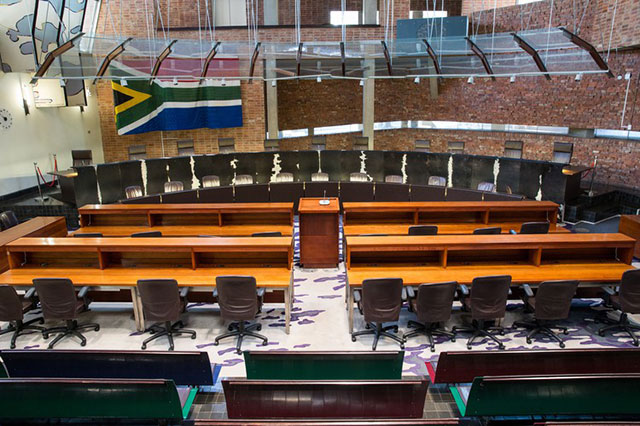The Constitutional Court has thrown out the Traditional and Khoi-San Leadership Act. Archive photo: Ashraf Hendricks
By Tania Broughton
- Parliament failed to ensure public participation before passing the Traditional and Khoi-San Leadership Act, says the Consitutional Court.
- The Court has given Parliament 24 months to re-enact the legislation or to start again.
- A public participation process must give the public a meaningful opportunity to influence Parliament, and Parliament must take into account the public’s views, said the judges in a unanimous finding.
The Constitutional Court, in a unanimous judgment, has ruled that the Traditional and Khoi-San Leadership Act is unconstitutional because Parliament “overwhelmingly failed in facilitating public participation”.
In the judgment, penned by Judge Leona Theron, the court has given Parliament 24 months to re-enact the law “in a manner that is consistent with the Constitution” or to pass a fresh law.
The stated aim of the Act was to provide for the recognition of traditional and Khoi-San communities and their leadership positions, and to establish provincial and local as well as a National House of Traditional and Khoi-San Leaders.
“The importance of public participation in South Africa cannot be understated,” Judge Theron said.
“Affected persons must be afforded the opportunity to meaningfully participate in legislative processes. Public participation acts as a safeguard to prevent the interests of the marginalised being ignored or misrepresented,” she said.
The applicants in the matter were Constance Mogale, the National Coordinator of the Alliance for Rural Democracy, an activist organisation which contests policy and legislation that threaten the land rights of people living in former Bantustans; the Land Access Movement; and two community representatives.
In their court papers, they described what they said were “deficiencies” in the public participation process in the lead up to the enactment of the Act, and how they had urged the President not to sign it into law. However, in December 2020, the President published a notice determining that it would come into force on 1 April 2021.
Judge Theron said the Constitutional Court had previously emphasised that Parliament had to ensure that a reasonable opportunity is offered to members of the public and all interested parties to know about an issue and have an adequate say.
The process must give the public a meaningful opportunity to influence Parliament, and Parliament must take into account the public’s views.
She said features of reasonable public participation included workshops and awareness programmes before public hearings, and summaries of the bills translated into at least three languages spoken in a particular province. Transport must be provided to hearings, she said.
This had not been done.
She said the Act was “a piece of legislation that is of immense significance, impacting millions of South Africans. It aims to regulate one of the most controversial, complex areas of South African society: traditional communities and traditional leadership, against a background of centuries of colonial and oppressive regulation.”
The Act concerned “controversial, complicated customary law matters”, she said. “This informs what was required of Parliament when consulting the public…and it required Parliament and provincial legislatures to consult thoroughly and carefully with members of the public.”
She said in respect of hearings organised by the National Assembly and the provincial legislatures, insufficient notice had been given, and information was often only given by word of mouth.
Hearings had been cancelled because of “poor attendance”.
There had been no education ahead of the hearings. In the Free State, for example, members of the public were told to attend by local branches of the ANC and thought the meetings were party events to discuss general service delivery and employment grievances.
Venues were changed at the last minute and promised transport never arrived.
Copies of the proposed Act were not always provided and when they were, it was not in a language the local community could understand.
At some meetings, people who wanted to speak out about the abuse of power by traditional leaders were silenced.
“Assessed together, the deficiencies which occurred at the different stages of public participation are numerous and numerical. Parliament attempted, in its submissions, to explain reasons for certain deficiencies as teething issues and lack of resources. Given the scale of the evidence gathered by the applicants, I am of no doubt that these deficiencies demonstrate a wide-ranging and substantial failure to facilitate public participation.”
“This renders the legislation invalid,” Judge Theron said.
The Legal Resources Centre, which was involved in the litigation, said the ruling “not only has significant implications for rural communities, land rights organisations and activists, but also reaffirms the fundamental principles of democracy, ensuring that the voices of all South Africans are heard and considered… It is a powerful reminder that public participation is not just a formality but a cornerstone of a just and inclusive society.”
Follow African Insider on Facebook, Twitter and Instagram
Source: GroundUp
Picture: Twitter/@AdvoBarryRoux
For more African news, visit Africaninsider.com


